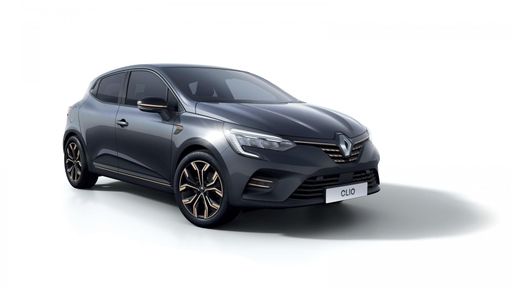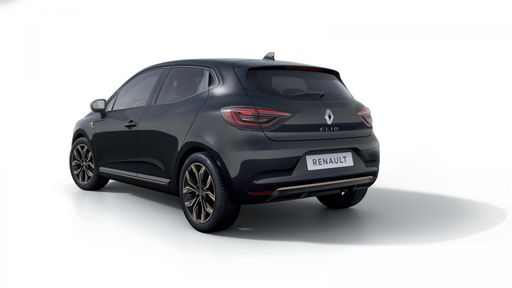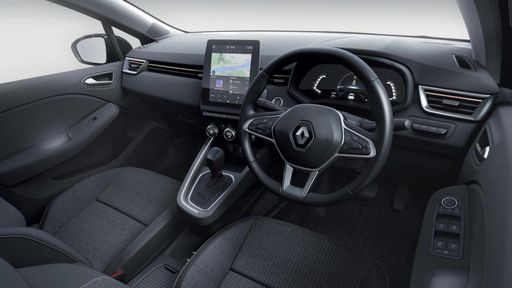Toyota Yaris vs Renault Clio – Differences & prices compared
Compare performance, boot space, consumption and price in one view.
Find out now: which car is the better choice for you – Toyota Yaris or Renault Clio?
The Toyota Yaris (Hatchback) comes with a Full Hybrid or Petrol engine and Automatic or Manuel transmission. In comparison, the Renault Clio (Hatchback) features a Full Hybrid or Petrol engine with Automatic or Manuel transmission.
When it comes to boot capacity, the Toyota Yaris offers 286 L, while the Renault Clio provides 391 L – depending on how much space you need. If you’re looking for more power, decide whether the 280 HP of the Toyota Yaris or the 143 HP of the Renault Clio suits your needs better.
In terms of consumption, the values are 3.80 L per 100 km for the Toyota Yaris, and 4.30 L for the Renault Clio.
Price-wise, the Toyota Yaris starts at 21900 £, while the Renault Clio is available from 16600 £. Compare all the details and find out which model fits your lifestyle best!
The Renault Clio and Toyota Yaris both stand out in the compact car segment, each offering distinct advantages for urban driving. The Clio impresses with its stylish design and exceptional fuel efficiency, appealing to those who prioritize aesthetics and running costs. Meanwhile, the Yaris shines with its advanced hybrid technology and Toyota's reputation for reliability, making it a strong choice for tech-savvy drivers who value a lower carbon footprint.
Toyota Yaris
The Toyota Yaris exudes a charming blend of practicality and style, making it an appealing choice for urban drivers. Its compact design allows for easy manoeuvrability in crowded city streets, while the interior offers a surprisingly spacious and comfortable environment. With a focus on fuel efficiency and reliability, the Yaris remains a popular option for those seeking a balance between performance and economy.
details @ Toyota
@ Toyota
 @ Toyota
@ Toyota
Renault Clio
The Renault Clio continues to impress with its sleek design and agile handling, making it a standout choice in the compact car segment. Inside, it offers a surprisingly spacious and comfortable cabin, crafted with high-quality materials that enhance the driving experience. Its fuel efficiency and reliable performance make it an attractive option for both city commuting and longer journeys.
details @ renault-presse.de
@ renault-presse.de
 @ renault-presse.de
@ renault-presse.de
 @ renault-presse.de
@ renault-presse.de
The Battle of Compact Efficiency: Renault Clio vs. Toyota Yaris
The world of compact cars has witnessed fierce competition, with manufacturers pushing the boundaries of technology and design. Among the frontrunners in this segment are the Renault Clio and the Toyota Yaris. Both hatchbacks come with a range of engine types, impressive efficiency, and innovative features. Let’s dive into the technical details to see how these iconic models stack up against each other.
Engine Options and Performance
The Renault Clio offers a diverse range of engine options, including full hybrid, petrol, and LPG variants. Power output ranges from 67 HP to 143 HP, and the car achieves acceleration from 0 to 100 km/h in as fast as 9.3 seconds with its hybrid model. The engines are paired with both manual and automatic transmissions, providing flexibility based on driver preference.
On the other hand, the Toyota Yaris also provides varied engine choices, including a full hybrid system and standard petrol variants. The Yaris hybrid model generates 116 HP, while a more robust petrol variant reaches up to 130 HP. Acceleration is brisk with the Yaris completing 0 to 100 km/h in just 9.2 seconds in its higher-spec model, showcasing its sporty potential.
Fuel Efficiency and Environmental Impact
When it comes to fuel efficiency, both cars deliver impressive figures. The Renault Clio hybrid manages a fuel consumption of 4.3 L/100 km, whereas the petrol versions vary slightly higher, peaking at 7 L/100 km. Additionally, the Clio falls within the CO2 efficiency classes C and D, reflecting its moderate environmental footprint with emissions ranging from 97 to 122 g/km.
The Toyota Yaris shines in efficiency, particularly with its hybrid, nudging a consumption of just 3.8 L/100 km. Its CO2 emissions are also comparatively lower, between 87 to 95 g/km, placing it in efficiency class B. This positions the Yaris as a more eco-friendly choice in the compact car market.
Dimensions and Practicality
Size and practicality are important facets for hatchback buyers. The Renault Clio stretches to 4053 mm in length and boasts a trunk capacity of 391 liters, which is ample for the compact segment. It provides comfortable seating for five, maintaining a balance between interior space and overall dimensions.
The Toyota Yaris, meanwhile, is slightly shorter at 3995 mm in its longest iteration, yet matches the Clio in practicality by offering five seats. However, its trunk space, at 286 liters, is a bit more limited compared to the Clio, but sufficient for everyday usage.
Innovations and Driving Experience
Renault has infused the Clio with modern technology and a user-centric interior, highlighting infotainment and driver-assistance systems. Features such as full smartphone integration and a customizable digital instrument display offer a cutting-edge experience in a car of its class.
Toyota has equipped the Yaris with equally advanced technology, emphasizing safety and comfort. The Toyota Safety Sense package provides comprehensive driver-assistance features that enhance driving confidence and occupant safety. Additionally, the Yaris’s hybrid technology ensures a smooth and quiet ride, appealing to urban commuters.
Conclusion: Choosing Between the Clio and the Yaris
The choice between the Renault Clio and the Toyota Yaris ultimately hinges on specific preferences and priorities. The Clio offers a diverse range of powertrains and a slightly larger cargo area, making it a versatile option. Meanwhile, the Yaris leads in environmental efficiency and innovative safety technologies. Both vehicles showcase what compact hatchbacks can achieve: a blend of efficiency, innovation, and practicality.

|

|
|
|
|
Costs and Consumption |
|
|---|---|
|
Price
21900 - 45000 £
|
Price
16600 - 23000 £
|
|
Consumption L/100km
3.8 - 9.5 L
|
Consumption L/100km
4.3 - 5.3 L
|
|
Consumption kWh/100km
-
|
Consumption kWh/100km
-
|
|
Electric Range
-
|
Electric Range
-
|
|
Battery Capacity
-
|
Battery Capacity
0.60 kWh
|
|
co2
87 - 215 g/km
|
co2
97 - 121 g/km
|
|
Fuel tank capacity
36 - 50 L
|
Fuel tank capacity
39 - 42 L
|
Dimensions and Body |
|
|---|---|
|
Body Type
Hatchback
|
Body Type
Hatchback
|
|
Seats
4 - 5
|
Seats
5
|
|
Doors
3 - 5
|
Doors
5
|
|
Curb weight
1090 - 1356 kg
|
Curb weight
1124 - 1331 kg
|
|
Trunk capacity
141 - 286 L
|
Trunk capacity
301 - 391 L
|
|
Length
3940 - 3995 mm
|
Length
4053 mm
|
|
Width
1745 - 1805 mm
|
Width
1798 mm
|
|
Height
1455 - 1500 mm
|
Height
1440 mm
|
|
Payload
289 - 525 kg
|
Payload
398 - 406 kg
|
Engine and Performance |
|
|---|---|
|
Engine Type
Full Hybrid, Petrol
|
Engine Type
Full Hybrid, Petrol
|
|
Transmission
Automatic, Manuel
|
Transmission
Automatic, Manuel
|
|
Transmission Detail
Manual Gearbox, Automatic Gearbox, CVT
|
Transmission Detail
Automatic Gearbox, Manual Gearbox
|
|
Drive Type
Front-Wheel Drive, All-Wheel Drive
|
Drive Type
Front-Wheel Drive
|
|
Power HP
116 - 280 HP
|
Power HP
67 - 143 HP
|
|
Acceleration 0-100km/h
5.5 - 9.7 s
|
Acceleration 0-100km/h
9.3 - 17.1 s
|
|
Max Speed
175 - 230 km/h
|
Max Speed
160 - 174 km/h
|
|
Torque
390 Nm
|
Torque
95 - 205 Nm
|
|
Number of Cylinders
3
|
Number of Cylinders
3 - 4
|
|
Power kW
85 - 206 kW
|
Power kW
49 - 105 kW
|
|
Engine capacity
1490 - 1618 cm3
|
Engine capacity
999 - 1598 cm3
|
General |
|
|---|---|
|
Model Year
2024 - 2025
|
Model Year
2023 - 2025
|
|
CO2 Efficiency Class
B, G
|
CO2 Efficiency Class
C, D
|
|
Brand
Toyota
|
Brand
Renault
|
Toyota Yaris
Introducing the Next-Gen Toyota Yaris: A Blend of Innovation and Technology
The Toyota Yaris has long been lauded for its efficiency, reliability, and practicality. As we venture into the 2024 model year, Toyota has upped the ante with the latest versions of this popular hatchback, melding cutting-edge technology with eco-conscious design. Here’s an in-depth look at what makes the current Yaris line-up stand out from the crowd.
Efficient Powertrains: Hybrid and Beyond
Spearheading the technological innovation in the Yaris range is the introduction of various hybrid models. The Yaris offers a 1.5-litre full-hybrid engine, marrying a petrol engine with an electric motor to produce between 116 and 130 PS. This power blend is controlled via a sophisticated CVT-gearbox, optimizing both performance and fuel efficiency, with consumption figures ranging from an impressive 3.8 to 4.2 litres per 100 km.
For those seeking pure performance, the GR Yaris variants provide a turbocharged 1.6-litre engine capable of producing 280 PS. This power is delivered via a choice of manual or automatic transmission, giving drivers the tactile involvement or convenience they desire.
Design that Fulfils and Inspires
The Yaris hasn't forgotten its roots as a compact, city-friendly hatchback, measuring between 3,940 and 3,995 mm in length. With its bold front grille, sleek lines, and a choice of striking colours, it's a car that turns heads while remaining perfectly suited for urban environments.
The interior is equally impressive, designed with a focus on driver convenience and comfort. Depending on the variant, Yaris can offer generous cargo space of up to 286 litres, making it a perfect companion for everyday tasks or weekend escapes.
Technological Integration: The Smart Choice
Toyota's approach goes beyond just improving engine technology; the Yaris is packed with innovative features aimed at enhancing the driving experience. It boasts a suite of advanced safety systems such as lane departure alert, pre-collision system, and adaptive cruise control, ensuring peace of mind on the road.
The infotainment system in the Yaris is designed to keep you connected, offering seamless smartphone integration, a user-friendly interface, and an intuitive navigation system, ensuring that you're always informed and entertained.
The Cost of Innovation
Owning a Yaris is not just about impressive technology; it's also about making economic sense. With a price range between €25,500 and €49,990, and monthly costs spanning from €748 to €1,513, it offers a broad spectrum to suit different budget needs.
Concerned about emissions? You can rest easy knowing that the Yaris boasts a CO2 efficiency class ranging from B to G, thanks to its low emissions output of between 87 to 215 g/km.
Conclusion: The Toyota Yaris Drives the Future
The Toyota Yaris continues to be a strong contender in the compact car segment, pushing boundaries with its innovative full-hybrid systems and performance-oriented GR models. It's a remarkable blend of design, technology, and economy, ensuring it remains a top choice for drivers who demand more from their hatchbacks.
Whether you're seeking the efficiency of a hybrid or the thrill of the GR Yaris, there's a model tailored to your unique driving needs in Toyota's latest Yaris lineup.
Renault Clio
Introduction to the Renault Clio
The Renault Clio, a popular choice among compact cars, has continually advanced its design and technology to maintain a strong position in the automotive market. With enhancements in engineering, efficiency, and aesthetic appeal, the Clio remains a top contender in the hatchback category.
Advanced Hybrid Technology
The Renault Clio's hybrid technology is one of its standout features. The E-Tech Hybrid system optimises both performance and efficiency, offering a seamless transition between electric and fuel-powered driving. This setup results in an impressive fuel consumption rate of 4.3 L/100km, making it an attractive option for eco-conscious drivers.
Efficient Engine Options
Renault offers a variety of engine choices for the Clio, accommodating different driving styles and preferences. From the economical SCe 65 manual variant to the powerful TCe 100 LPG gas version, each option is engineered to balance performance with fuel efficiency. With outputs ranging from 67 to 143 PS, drivers can enjoy a tailored driving experience.
Design and Comfort
The Renault Clio stands out with its sleek and modern design, characterized by its hatchback body style. The interior boasts an ergonomic layout with seating for five, ensuring passenger comfort and convenience. With a boot capacity of 301 to 391 litres, the Clio also offers practical storage solutions for everyday use.
Safety and Innovation
Safety is a key priority for Renault, and the Clio reflects this commitment with its suite of innovative safety features. Advanced driver-assistance systems are integrated throughout, enhancing both safety and usability. The Clio encompasses features like lane departure warning, automatic emergency braking, and adaptive cruise control.
Cost Efficiency and Environmental Impact
The Renault Clio not only offers affordability with pricing ranging from €18,450 to €26,800, but also promises low running costs. With CO2 emissions between 97 and 130 g/km, the Clio fits well within the C and D efficiency classes. This makes it a cost-effective and environmentally friendly choice for modern drivers.
Conclusion
Renault Clio remains a dynamic, dependable and economical option in the compact car segment. With its innovative technologies, diverse engine options, and commitment to safety and design, the Clio continues to impress and adapt to the evolving demands of the automotive world.
What drivetrain options does the Toyota Yaris have?
The Toyota Yaris is offered with Front-Wheel Drive or All-Wheel Drive.
The prices and data displayed are estimates based on German list prices and may vary by country. This information is not legally binding.
